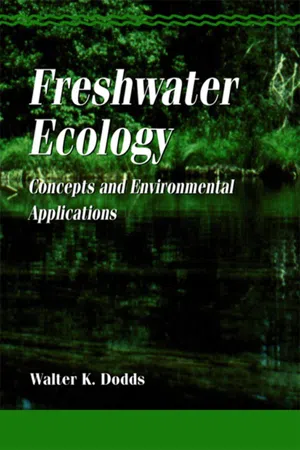
eBook - ePub
Freshwater Ecology
Concepts and Environmental Applications
Walter K. Dodds
This is a test
- 569 pages
- English
- ePUB (mobile friendly)
- Available on iOS & Android
eBook - ePub
Freshwater Ecology
Concepts and Environmental Applications
Walter K. Dodds
Book details
Table of contents
Citations
About This Book
Freshwater Ecology: Concepts and Environmental Applications is a general text covering both basic and applied aspects of freshwater ecology and serves as an introduction to the study of lakes and streams. Issues of spatial and temporal scale, anthropogenic impacts, and application of current ecological concepts are covered along with ideas that are presented in more traditional limnological texts. Chapters on biodiversity, toxic chemicals, extreme and unusual habitats, and fisheries increase the breadth of material covered. The book includes an extensive glossary, questions for thought, worked examples of equations, and real-life problems.
- Broad coverage of groundwaters, streams, wetlands, and lakes
- Features basic scientific concepts and environmental applications throughout
- Includes many figures, sidebars of fascinating applications, and biographies of practicing aquatic ecologists
- Materials are presented to facilitate learning, including an extensive glossary, questions for thought, worked examples of equations, and real life problems
- Written at a level understandable to most undergraduate students, with explanations of complex contemporary concepts in freshwater ecology described to promote understanding
- Featuring small chapters that mainly stand alone, this book can be read in the order most suited to the specific application
Frequently asked questions
How do I cancel my subscription?
Can/how do I download books?
At the moment all of our mobile-responsive ePub books are available to download via the app. Most of our PDFs are also available to download and we're working on making the final remaining ones downloadable now. Learn more here.
What is the difference between the pricing plans?
Both plans give you full access to the library and all of Perlego’s features. The only differences are the price and subscription period: With the annual plan you’ll save around 30% compared to 12 months on the monthly plan.
What is Perlego?
We are an online textbook subscription service, where you can get access to an entire online library for less than the price of a single book per month. With over 1 million books across 1000+ topics, we’ve got you covered! Learn more here.
Do you support text-to-speech?
Look out for the read-aloud symbol on your next book to see if you can listen to it. The read-aloud tool reads text aloud for you, highlighting the text as it is being read. You can pause it, speed it up and slow it down. Learn more here.
Is Freshwater Ecology an online PDF/ePUB?
Yes, you can access Freshwater Ecology by Walter K. Dodds in PDF and/or ePUB format, as well as other popular books in Biological Sciences & Ecology. We have over one million books available in our catalogue for you to explore.
Information
Table of contents
Citation styles for Freshwater Ecology
APA 6 Citation
Dodds, W. (2002). Freshwater Ecology ([edition missing]). Elsevier Science. Retrieved from https://www.perlego.com/book/1834847/freshwater-ecology-pdf (Original work published 2002)
Chicago Citation
Dodds, Walter. (2002) 2002. Freshwater Ecology. [Edition missing]. Elsevier Science. https://www.perlego.com/book/1834847/freshwater-ecology-pdf.
Harvard Citation
Dodds, W. (2002) Freshwater Ecology. [edition missing]. Elsevier Science. Available at: https://www.perlego.com/book/1834847/freshwater-ecology-pdf (Accessed: 25 September 2021).
MLA 7 Citation
Dodds, Walter. Freshwater Ecology. [edition missing]. Elsevier Science, 2002. Web. 25 Sept. 2021.